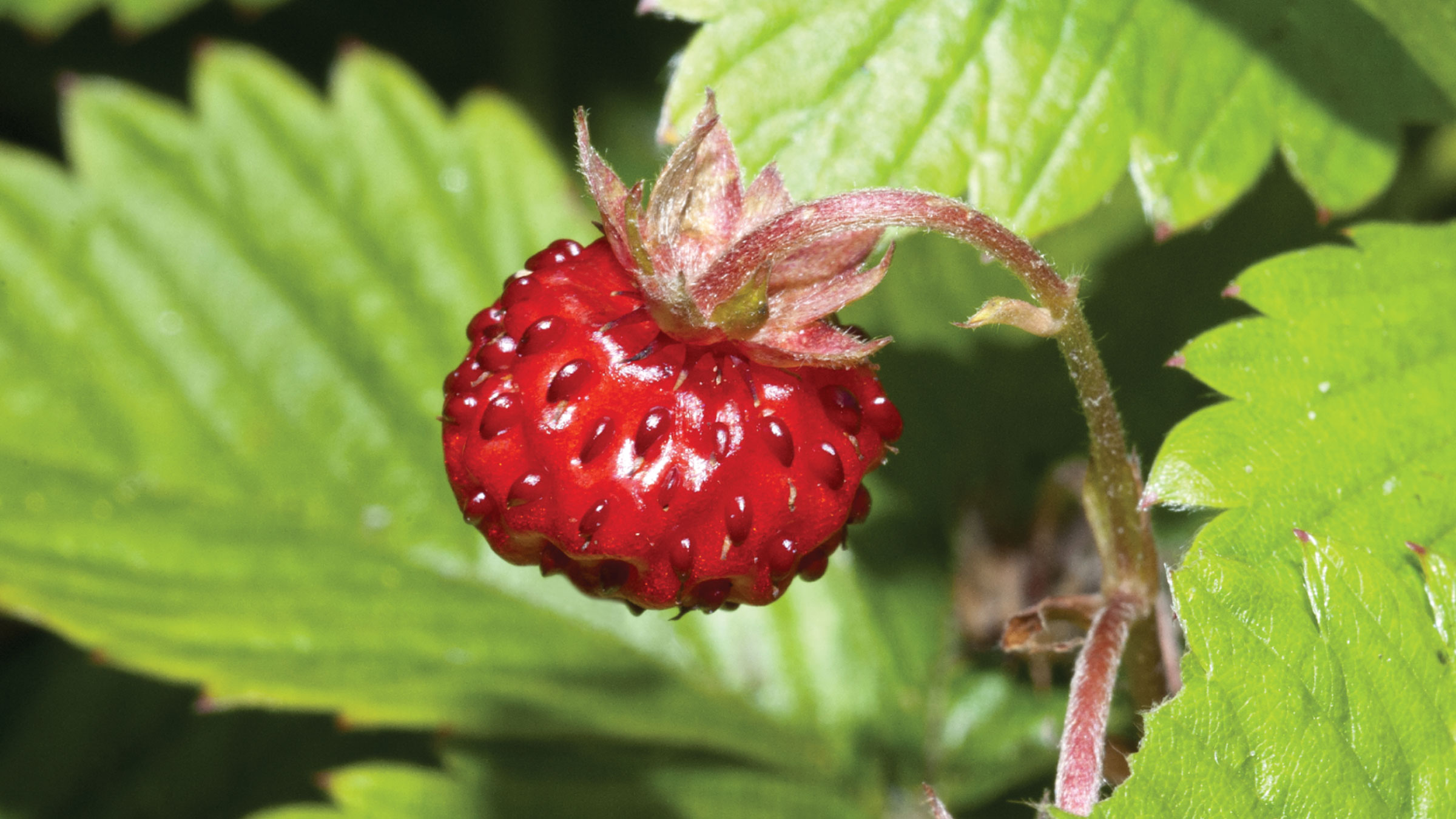
Wild Strawberry
The wild strawberry is the first to greet you in the beer garden as it is the leader of the berries, being the first to flower, ripen and provide food for our pollinators in the early summer months. It is the first true sign that summer is here, and it does so by providing the sweetest of rewards.
Although smaller than their commercial cousin, these wild berries invoke summer thoughts of pool parties, ice cream trucks, patio beers, and long summer evenings that never end. You can enjoy wild strawberries by planting them in your garden in May, they do best in full sun and only require 1.5 inches of water a week. So in the rainy springs in Ohio, they can be very self-sufficient. Also, since they are perennials, once you plant them, you will never have to plant them again!
We could go on and on about wild strawberries, but we will let Robin Wall Kimmerer do that for us:
“White petals with a yellow center — like a little wild rose — they dotted the acres of curl grass in May during the Flower Moon, waabigwanigiizis. We kept good track of them, peeking under the trifoliate leaves to check their progress as we ran through on our way to catch frogs. After the flower finally dropped its petals, a tiny green nub appeared in its place, and as the days got longer and warmer it swelled to a small white berry. These were sour but we ate them anyway, impatient for the real thing.
You could smell ripe strawberries before you saw them, the fragrance mingling with the smell of sun on clamp ground. It was the smell of June, the last clay of school, when we were set free, and the Strawberry Moon, ode’mini-giizis. I’d lie on my stomach in my favorite patches, watching the berries grow sweeter and bigger under the leaves. Each tiny wild berry was scarcely bigger than a raindrop, dimpled with seeds under the cap of leaves. From that vantage point I could pick only the reddest of the red, leaving the pink ones for tomorrow.
Even now, after more than fifty Strawberry Moons, finding a patch of wild strawberries still touches me with a sensation of surprise, a feeling of unworthiness and gratitude for the generosity and kindness that comes with an unexpected gift all wrapped in red and green. “Really? For me? Oh, you shouldn’t have.” After fifty years they still raise the question of how to respond to their generosity. Sometimes it feels like a silly question with a very simple answer: eat them.
But I know that someone else has wondered these same things. In our Creation stories the origin of strawberries is important. Skywoman’s beautiful daughter, whom she carried in her womb from Skyworld, grew on the good green earth, loving and loved by all the other beings. But tragedy befell her when she died giving birth to her twins, Flint and Sapling. Heartbroken, Skywoman burial her beloved daughter in the earth. Her final gifts, our most revered plants, grew from her body. The strawberry arose from her heart. In Potawatomi, the strawberry is ode min, the heart berry. We recognize them as the leaders of the berries, the first to bear fruit.
Strawberries first shaped my view of a world full of gifts simply scattered at your feet. A gift comes to you through no action of your own, free, having moved toward you without your beckoning. It is not a reward; you cannot earn it, or call it to you, or even deserve it. And yet it appears. Your only role is to be open-eyed and present. Gifts exist in a realm of humility and mystery — as with random acts of kindness, we do not know their source.
Those fields of my childhood showered us with strawberries, raspberries, blackberries, hickory nuts in the fall, bouquets of wildflowers brought to my mom, and family walks on Sunday afternoon. They were our playground, retreat, wildlife sanctuary, ecology classroom, and the place where we learned to shoot tin cans off the stone wall. All for free. Or so I thought.
In our family, the presents we gave one another were almost always homemade. I thought that was the definition of a gift: something you made for someone else. We made all our Christmas gifts: piggy banks from old Clorox bottles, hot pads from broken clothespins, and puppets from retired socks. My mother says it was because we had no money for store-bought presents. It didn’t stem like a hardship to me; it was something special.
My father loves wild strawberries, so for Father’s Day my mother would almost always make him strawberry shortcake. She baked the crusty shortcakes and whipped the heavy cream, but we kids were responsible for the berries. We each got an old jar or two and spent the Saturday before the celebration out in the fields, taking forever to fill them as more and more berries ended up in our mouths. Finally, we returned home and poured them out on the kitchen table to sort out the bugs. I’m sure we missed some, but Dad never mentioned the extra protein.
In fact, he thought wild strawberry shortcake was the best possible present, or so he had us convinced. It was a gift that could never be bought. As children raised by strawberries, we were probably unaware that the gift of berries was from the fields themselves, not from us. Our gift was time and attention and care and red-stained fingers. Heart berries, indeed.
